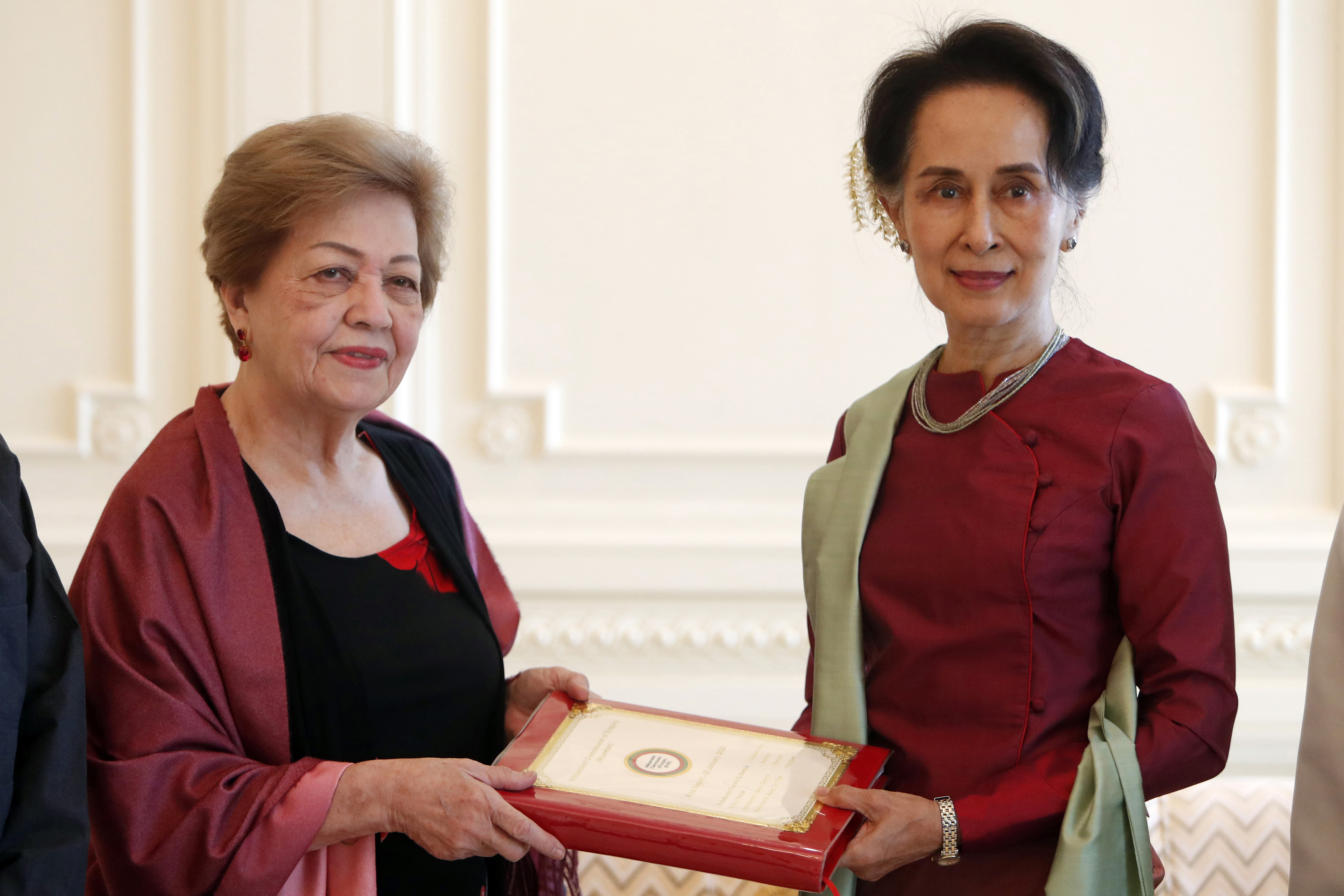Genocide charge dents halo of Myanmar’s Suu Kyi

FILE – In this Jan. 20, 2020, file photo, Myanmar’s leader Aung San Suu Kyi, right, receives a final report from Philippine diplomat Rosario Manalo, a member of the Independent Commission of Enquiry for Rakhine State, at the Presidential Palace in Naypyitaw, Myanmar. When Suu Kyi walked into the International Court of Justice in December, 2019, she gambled the remaining shreds of her hard-won international reputation on a rebuttal of accusations that her country’s military committed genocide against minority Rohingya Muslims. (AP Photo/Aung Shine Oo, File)
BANGKOK — When Myanmar’s Aung San Suu Kyi walked into the International Court of Justice last month, she gambled the remaining shreds of her hard-won international reputation on a rebuttal of accusations that her country’s military committed genocide against minority Rohingya Muslims.
The court was not persuaded. This past week, it ordered Myanmar to take all possible measures to prevent genocide against the Rohingya.
Suu Kyi’s willingness to defend human rights abuses on the global stage was a move more likely aimed at burnishing her nationalist credential at home rather than swaying the court.
For her former admirers, Suu Kyi’s defense only underlined her responsibility for failing to at least speak out in defense of the Rohingya.
“With this ICJ ruling, she has suffered a spectacular fall from grace,” said Bill Richardson, a former U.S. congressman and U.N. ambassador. “She has gone from a Nobel Prize champion of democracy to just another dictator wanting to maintain her power by defending military repression, genocide, and the banishment of the Rohingya.”
Article continues after this advertisementAfter taking the helm of Myanmar’s nascent pro-democracy movement in 1988, Suu Kyi’s brave defiance of military rule, at high personal cost, made her the object of worldwide adulation. She won the 1991 Nobel Peace Prize, cited for being “one of the most extraordinary examples of civil courage in Asia in recent decades.”
Article continues after this advertisementWhen her nonviolent struggle finally paid off in 2015 with a smashing election victory by her National League for Democracy party, there was optimism that Myanmar had finally turned a corner after decades of military rule.
Former President Barack Obama commended Suu Kyi for “her tireless efforts and sacrifice over so many years to promote a more inclusive, peaceful, and democratic” Myanmar.
Then came the crackdown.
In 2017, Myanmar security forces launched a counterinsurgency operation in western Rakhine state that, compelling evidence shows, involved mass rape, killings and the burning of entire villages. More than 700,000 Rohingya fled to neighboring Bangladesh, reluctant to return until their basic rights including citizenship are guaranteed.
As the magnitude of the Rohingya tragedy emerged, 1984 Nobel Peace laureate Archbishop Desmond Tutu felt compelled to appeal to Suu Kyi.
“My dear sister: If the political price of your ascension to the highest office in Myanmar is your silence, the price is surely too steep. … We pray for you to speak out for justice, human rights and the unity of your people. We pray for you to intervene,” the South African wrote in an open letter.
Richardson is less diplomatic in expressing his dismay.
He had accepted Suu Kyi’s invitation to join an advisory board on the Rakhine crisis. But in early 2018, when he suggested to Suu Kyi that two Reuters reporters arrested for exposing abuse by the security forces be released, she reacted furiously. Disillusioned, he quit the board.
“I could see the reformer and former champion of democracy … turning into a power-loving and entrenched leader,” he said. “She was becoming an apologist for the military so she could hold onto her power and get reelected. She simply could not tolerate any dissent, even from her longtime friends and supporters like myself.”
Political realities play an important role in Suu Kyi’s position. Despite her party’s landslide election victory, the military retains huge influence in government due to clauses it inserted in the constitution.
To exercise real power, her party must mobilize popular and electoral support.
After she led her country’s delegation at the initial hearings last month at the International Court of Justice, she returned to Myanmar to cheering crowds lining the streets.
“Undoubtedly, ahead of an election year, her decision to personally defend the case, making it about her, and using it as an opportunity to whip up nationalism, has boosted her public support ahead of an election year,” wrote Burma Campaign UK, a lobbying group that had been her ally against military rule.
There’s also a more personal aspect to Suu Kyi’s predicament, some expert say.
Her father, Gen. Aung San, was the country’s independence hero. She was only 2 years old when he was assassinated by political rivals in 1947, a year before freedom from Britain.
“Although she talks a lot about democracy, I think she has a more messianic concept of her present and future role, based on her father’s reputation,” David Steinberg, a professor of Asian Studies at Georgetown University, said in an email interview last month.
Suu Kyi entered Myanmar’s politics in 1988, when she returned from a life spent mostly abroad to nurse her dying mother. She became swept up in a popular revolt against military rule, and shot to fame as her father’s daughter with a speech to hundreds of thousands of people.
“Her moral authority in Myanmar is predicated on the aura of her father and what he represents, and in the fact that she came in to ‘save the country’ in 1988 and endured so many years under house arrest,” said Jane Ferguson, a senior lecturer in anthropology at The Australian National University.
Asked once in a BBC interview about her reputation as a saintly figure, Suu Kyi replied: “I am just a politician. I am not quite like Margaret Thatcher, no, but on the other hand, I am no Mother Teresa either. I have never said that I was. Mahatma Gandhi, actually, was a very astute politician.”